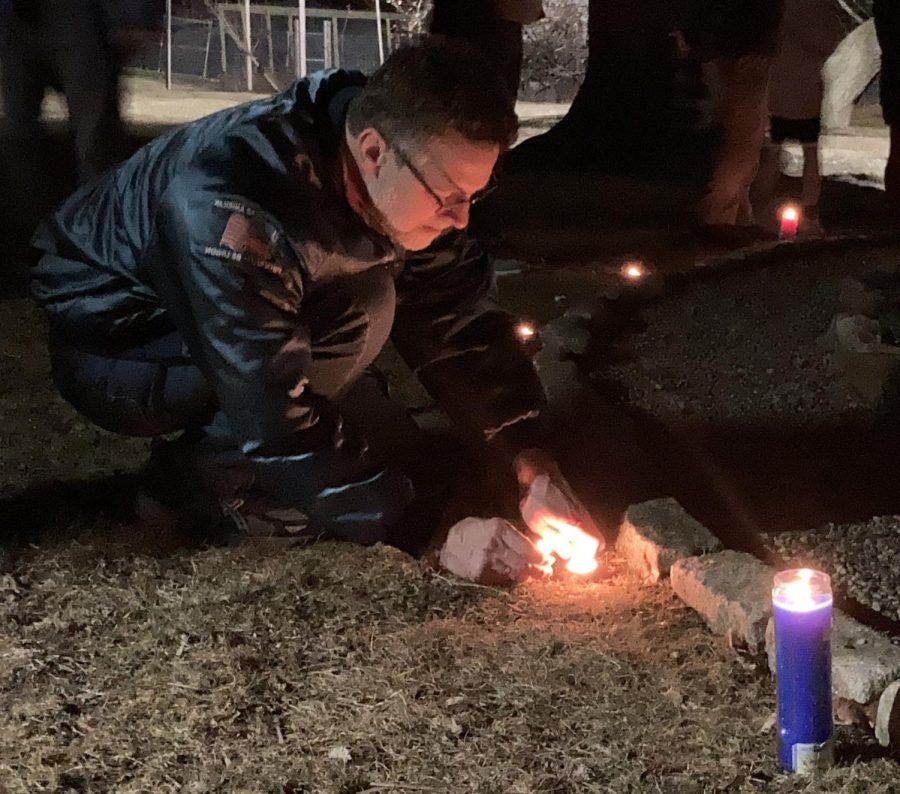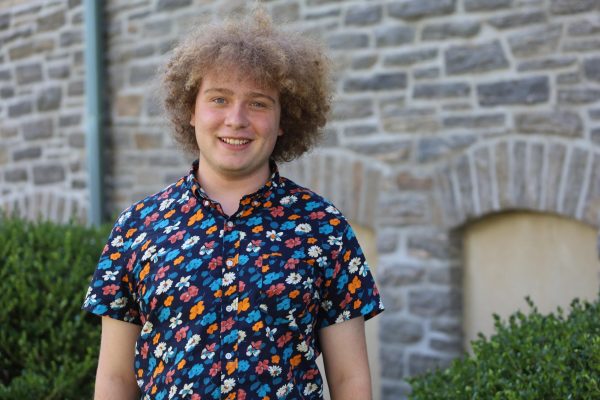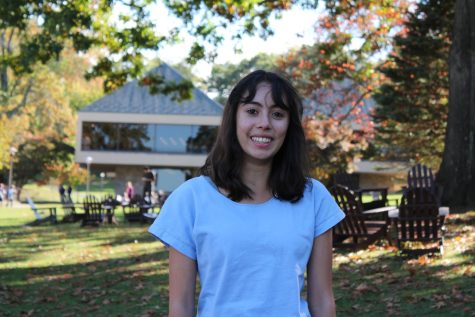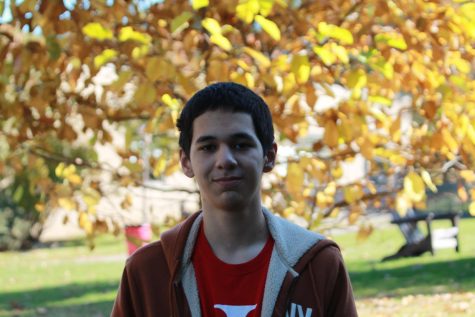Attacks on Ukraine strike close to home
English teacher Paul West lights a candle around the labyrinth during the Candlelight Vigil for Peace in Ukraine on March 6. There were about 6 people in attendance.
March 12, 2022
The ongoing war in Ukraine is the largest armed conflict in Europe since World War II. What has been oddly shocking is the slow yet unstoppable feeling of escalation, as Russia had begun to make demands over Ukraine’s territory earlier this year.
Conflict in Ukraine has been ongoing since 2014, when Russian President Vladimir Putin ordered the annexation of the Crimean Peninsula, the sovereign territory of Ukraine. Additionally, conflict in the largely Russian-speaking Donbas region of eastern Ukraine erupted between separatist militias and the Ukrainian military. Since, there have been thousands of casualties on both sides.
“I was a refugee eight years ago because there was a war in my region before,” said junior Nataliia Kulieshova. She is from a small town on the outskirts of Donetsk. “By saying that these regions were independent, Putin said that all the cities that are controlled by Ukraine right now, including my city, would be attacked by Russian troops to ‘denazify’ and things like this. I was extremely anxious. I thought my town would be one of the first to be attacked.”
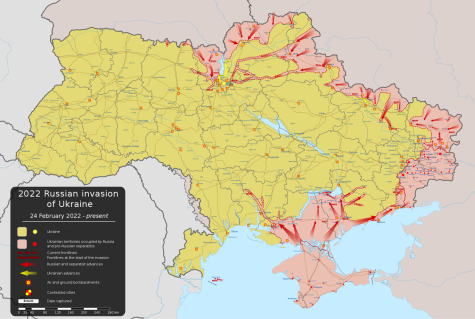
“Russia uses a lot of weapons that are banned from the Geneva Convention, and I think that people don’t know this in the U.S., but Russia used vacuum bombs, which is like one step away from the nuclear bombs. They have vacuum bombs that have a bigger impact than some nuclear bombs; the fact that they’ve used it already in civilian cities—it’s just… It’s terrible,” Kulieshova said.
Kulieshova and junior Viktoriia Sokolenko, who comes from Kyiv, are both Ukrainian students who attend The Masters School. From different regions of Ukraine, both have families currently sheltering every day from Russian aggression.
“I was sitting and people said they were hearing the explosions in Kyiv, and I was checking in on my family. It was kind of scary because it was the morning and we were calling them on all different messengers to see if they’re okay and where they are,” Sokolenko said.
Vladimir Putin cites Russia’s recent recognition of the “Donetsk People’s Republic” and the “Luhansk People’s Republic” as independent, largely Russian speaking, nations as one of the reasons for the invasion. Putin has used this language divide – along with unfounded allegations of genocide at the hands of the Ukrainian government – to justify supporting the Donetsk and Luhansk separatists. Kulieshova, who hails from the Donbas region, completely rejected the notion that the Donbas is rightfully Russian because of language. Both Kulieshova and Sokolenko mentioned that the President of Ukraine Volodymyr Zelensky grew up in a Russian-speaking family.
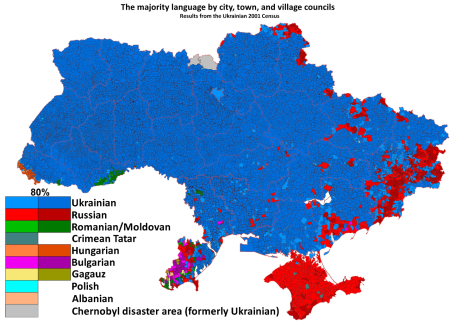
“Especially after eight years of war, I feel like every Ukrainian has some sort of skepticism about Russia, and especially right now, people actually go out, they go unarmed, and go out on major highways of their cities to block the tanks of Russian people. Some people block the tanks of Russians with tractors. We don’t want you [the Russians] to save us.”
Putin’s decision to invade remains largely incomprehensible to many experts in the West. Dr. Robert Fish, who teaches international relations at Masters said,“I don’t know why Putin is pursuing this. I don’t know. I don’t see, strategically, why this was so important to him. I just don’t. I don’t see Ukraine as an intensely important strategic location.”
Olga Tymchenko, a violin instructor at Masters, grew up in Soviet-era Kyiv before emigrating to the U.S. in 2000. Many of her family and friends still live in the Kyiv area. Tymchenko also emphasized how crucial it is to remember that there are millions of people seeking safety at this very moment.
“Every single moment, it’s heartbreaking. During the night, I’m picking up the phone, I’m checking on my friends, and during the day, getting the urgent calls, saying a prayer, or the bomb is right near our house. Sunday morning I received a picture from the city of Irpin, which is in the outskirts of Kyiv. My parents’ church was there; I would go there every Sunday. And right now it’s under siege, and on Sunday I received a picture of a family trying to escape. And they were just shooting. A friend of mine also wrote ‘we are under siege, there is no water, no electricity, no heat, no food, nothing. They are shooting at everything that is moving,’” she said.
Most of Tymchenko’s family escaped to Poland days before the war broke out. “But then my brother came back to Ukraine to help the war effort, so he was trying to escape, and then he brought his niece to Poland, and then he came back to Ukraine to bring more people to escape. My brother is now in the hospital and the patients of that hospital are taken as hostages.”
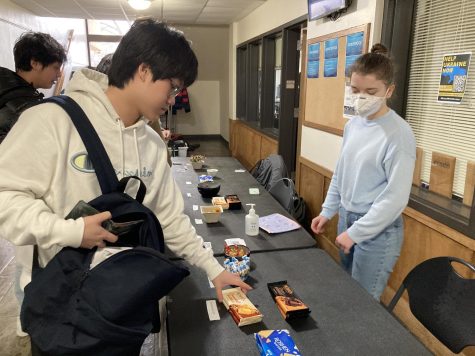
Sokolenko and Kulieshova have taken fundraising into their own hands, selling Ukrainian candy during lunch, the proceeds of which go to Razom, a lauded aid charity currently working in Ukraine. Tymchenko placed a particular emphasis on reaching out to those in power and with high influence. “If everyone could do what they possibly could – calling their representative, and calling to their senator, asking to close the skies…Ukraine is fighting for democracy, Ukraine is fighting for freedom, and for every citizen of every free country – I think it’s our right to help. It’s our responsibility to help in the way we can.”




